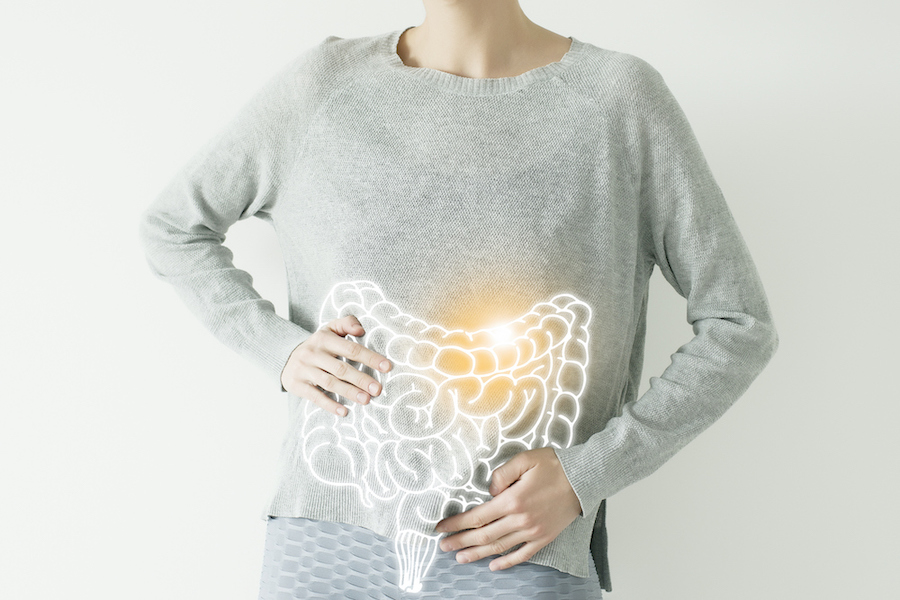The term "gut microbiome" has made a dynamic entry into our daily lives and you will surely have heard references to it. Many studies, especially in recent years, have suggested an association between good gut health and the immune system, mood, good mental health, endocrine disorders, the development of autoimmune diseases, skin diseases and cancer (1).
The term "intestinal microbiome" refers specifically to the microorganisms that colonize the gastrointestinal tract, which number 300-5000 different species in each person.
But when is our intestinal microbiome disturbed?
Many factors in modern day life, such as stress, sleep patterns, processed foods, taking antibiotics, etc., can upset the delicate microbial balance. This, in turn, has negative effects on the mind, heart, immune system, skin, weight, hormone levels, ability to absorb nutrients, etc.
There are many signs of intestinal microbiome disorder.
-
"Anxious" stomach / intestine.
Symptoms such as gas, bloating, constipation, diarrhea and heartburn may indicate an imbalance in the intestinal microbiome.
In case you suffer from constipation we recommend Izicol. Izicol is a medical device with Macrogol 3350 in powder form, dissolved in water, which contributes to the successful treatment of constipation. It is a moisturizing agent, which increases the volume and moisture of the stool, as much as needed, to achieve a normal defecation. It is completely safe, as it is recommended by the World Gastroenterology Organization (WGO) as a therapeutic reference solution in the management of functional constipation.
Learn more about Izicol and Macrogol 3350 here https://izicol.gr/
-
Increased appetite for sugar
A diet made up of processed foods, with the addition of sugar, can reduce the number of "good" bacteria in the gut. The resulting imbalance leads to an increased appetite for sugar, which further destroys the intestinal flora.
-
Weight changes
Weight fluctuations, which are not related to dietary changes or exercise, may be an indication of an unbalanced microbiome. In this case, the body is unable to absorb nutrients, regulate blood glucose levels and store fat. Weight loss will also be due to a phenomenon called "small intestinal bacterial growth" (SIBO). Weight gain, on the other hand, is due to insulin resistance or overeating, caused by reduced nutrient intake.
-
Sleep disorders and chronic fatigue
An unbalanced microbiome can contribute to sleep disorders (insomnia, poor sleep quality) and consequently to chronic fatigue. Most of the serotonin, a hormone responsible for mood and sleep, is produced in the gut. This means that a disorder in the intestinal microbiome can affect the quality of sleep.
-
Skin irritations
Some skin irritations, such as eczema, may be related to the intestinal microbiome. Inflammation, caused in the gut by poor diet or allergies to certain foods, can lead to overproduction of certain proteins, which in turn can cause skin diseases.
-
Autoimmune Diseases
New studies support the hypothesis that the intestinal microbiome affects the immune system (2). It is believed that an unbalanced intestinal microbiome can lead to systemic inflammation and thus affect the functioning of the immune system, thus contributing to the development of autoimmune diseases.
-
Intolerance
Intolerance to various foods is the result of their inability to be digested. The question has been raised as to whether intolerances are due to intestinal microbiome disorders. This can lead to difficulty digesting certain foods and unwanted symptoms such as bloating, gas, diarrhea, abdominal pain and nausea.
Tips to improve gut health
-
Less stress
Chronic stress affects the whole body, including the intestines. Some ways to reduce stress are meditation, walking, massage, spending time with friends, reducing caffeine intake, yoga practice or pets.
-
Adequacy of sleep
Decreased sleep or poor sleep quality affects the beneficial bacteria, which in turn affect sleep. This is a vicious cycle of fatigue and disruption of the intestinal microbiome. Sleeping for 7-8 hours at night can help the intestinal microbiome to function properly.
-
Eat slowly
Proper chewing of food and eating more slowly help in better digestion and proper absorption of nutrients. This helps reduce indigestion and helps maintain a healthy microbiome.
-
Good hydration
Good hydration helps reduce digestive dysfunction. Intake of sufficient amount of water is beneficial for the microorganisms that colonize the intestine and for maintaining the balance in which they are.
-
Dietary supplements with probiotics and prebiotics
Taking a dietary supplement, as a new daily habit, is a great solution to improve gut health. Probiotics are the "good" and beneficial bacteria that colonize the intestinal tract. Prebiotics are the "food" of probiotics and contribute to their development. A dietary supplement with probiotics and prebiotics can be a very good practice for the immediate improvement and balance of the intestinal microbiome, as long as it suits the needs of each organism.
LactoBiome, for example, is a dietary supplement with probiotics, prebiotics and B-complex vitamins. It is a symbiotic formula for balancing and repairing the intestinal microbiome, with 5 billion live bacterial strains. It is suitable for the prevention and treatment of acute diarrhea associated with antibiotics, viral gastroenteritis, reduction of the symptoms of Irritable Bowel Syndrome (IBS), diarrhea of any etiology, etc.
Learn more about LactoBiome here https://microbioma.gr/lactobiome/
-
Research for intolerance
If cramps, bloating, abdominal pain, diarrhea, rash, nausea, tiredness and heartburn occur after eating, then some intolerance may lurk. First, you can try to exclude certain foods from your diet and see if your symptoms improve. If you find these foods, you can significantly improve the health of your gut.
-
Dietary changes
Reducing the consumption of processed foods, sugar intake and high-fat foods can significantly contribute to improving gut health. In addition, eating foods high in fiber and lean meats also help keep the gut functioning properly. A diet rich in fiber has been shown to contribute significantly to a healthy microbiome (3).



